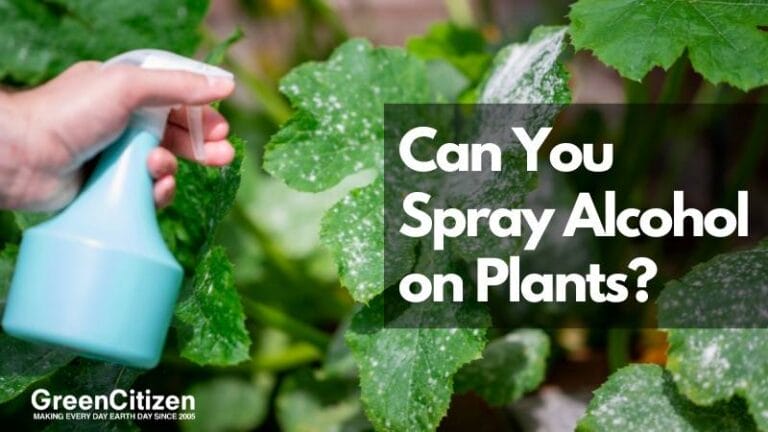Gardening is supposed to feel relaxing, not like a tiny war zone. But the moment aphids, mealybugs, fungus gnats, or spider mites show up, it’s tempting to grab whatever “works fast” and call it a day.
That’s where this question comes in: can you spray alcohol on plants?
Yes, you can spray alcohol on plants, but only in very specific situations, and only with the right dilution and technique. Alcohol can kill soft-bodied pests on contact, but it can also strip the protective coating on leaves, trigger leaf burn, and cause dehydration stress. In other words, it’s a tool, not a habit.
If you want a safer long-term approach, skip ahead to the alternatives like neem oil, insecticidal soap, sticky traps, and biological controls. They usually solve the problem without torching your leaves.
💡Quick Answer: Can You Spray Alcohol on Plants?
You can spray alcohol on plants, but it’s best used as a last resort for spot treatments, not as a whole-plant “bath.” When alcohol is too strong or sprayed too heavily, it can damage leaf tissue (phytotoxicity), pull moisture out of leaves, and leave plants stressed for weeks.
If you do use it:
- Use isopropyl (rubbing alcohol), not methanol
- Keep the solution very diluted
- Patch test a small area first
- Avoid spraying in direct sun or on thirsty plants
When Spraying Alcohol on Plants Makes Sense (and When It Doesn’t)
When It Can Make Sense
Alcohol is most useful when you’re dealing with pests that are easy to kill on contact, especially when they’re clustered in one area.
Best use cases:
- Mealybugs tucked into leaf joints and stems
- Aphids on tender new growth
- Spider mites (helpful, but you’ll usually need repeats)
- A small outbreak you want to knock down quickly before switching to safer methods
When It’s a Bad Idea
If you treat alcohol like a “spray and pray” solution, plants can pay the price.
Avoid alcohol sprays when:
- The plant is already wilting or heat-stressed
- You’re dealing with seedlings or delicate leaves (like many ferns)
- You’re tempted to spray the entire plant “just in case”
- You want to spray the soil/plant bed (more on that below)
Types of Alcohol and What They Do to Plants
Not all alcohol is the same. If you’re going to spray alcohol on plants, you need to know which kind you’re dealing with.
Rubbing Alcohol (Isopropyl Alcohol)
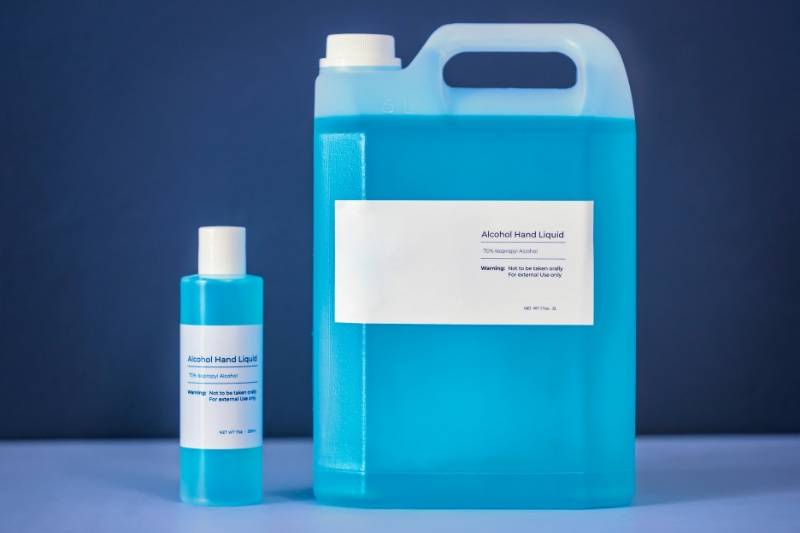
Isopropyl alcohol is the common “rubbing alcohol” most people have at home. It can kill soft-bodied pests like aphids, mealybugs, gnats, and spider miteson contact, but it’s also the most likely option people overuse.
What it’s good for:
- Spot-treating mealybugs and aphids
- Wiping pests off stems and leaf joints
What can go wrong:
- Leaf scorch/leaf burn
- Cuticle damage (it can strip the waxy protective layer)
- Dehydration and browning, especially on thin leaves
If you use it, dilution and restraint matter more than the spray bottle itself.
Ethanol (Vodka, Liquor, etc.)

Ethanol, the alcohol in drinks like vodka, wine, and whiskey, can be used to control pests, but it has big downsides. It works like rubbing alcohol but can badly damage plants if not diluted properly, leading to wilting and death. Even at 10% dilution, it can harm plants.
A friend of mine once used ethanol on her rose bushes to kill aphids. While it got rid of pests, her plants suffered leaf damage. High ethanol levels can stress plants, slow growth, and cause leaf yellowing. So, the risks usually outweigh the benefits, making ethanol a risky option for plants.
Bottom line: Ethanol can work similarly to isopropyl on pests, but the plant damage risk is high, so it’s not my favorite option.
Methanol (Do NOT Use)
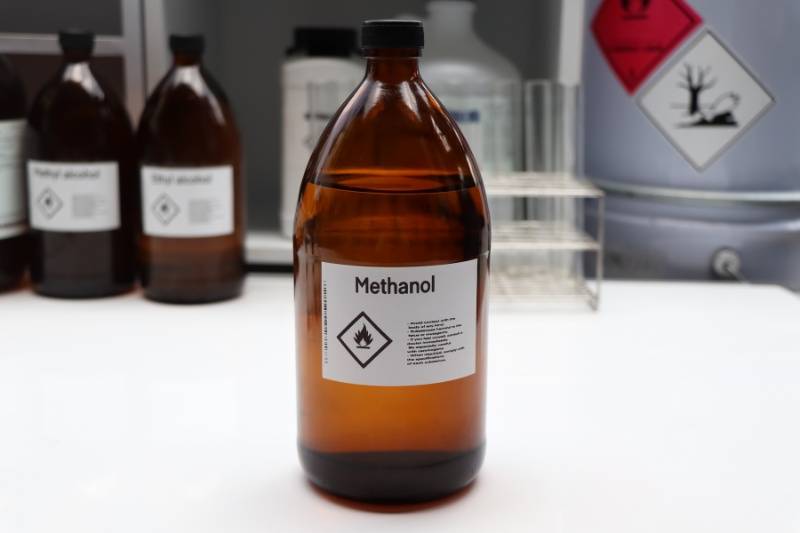
Methanol is the worst alcohol to use on plants because it’s very toxic. It can kill pests but also harm plants and humans. Methanol can get into your skin and is very dangerous if swallowed. Even when diluted, it can badly damage plants. Methanol is also an effective herbicide, meaning it can kill plants and make the plant bedding toxic.
A study found that methanol extracts significantly stunted the germination and growth of various plants, proving its effectiveness as a herbicide. Because of these risks, it’s best not to use methanol on plants at all.
Safe Dilution Guide for Spraying Rubbing Alcohol on Plants
Here’s the part most people mess up: alcohol doesn’t need to be strong to cause damage, and “more” does not mean “better.”
A Safer Starting Point
If you’re using 70% isopropyl alcohol, a gentle starting dilution is:
1 part rubbing alcohol to 20 parts water
This keeps the final mix low enough to reduce the odds of leaf damage while still helping with spot pest control.
Patch Test First (Seriously)
Before you spray anything widely:
- Pick one or two leaves (preferably not the newest growth)
- Spray lightly or dab the solution on with a cotton swab
- Wait 24 hours
- If you see browning, spotting, curling, or crispy edges, stop and switch methods
How to Apply Without Stressing The Plant
Alcohol is best as a targeted tool.
Best practices:
- Spray or dab only where pests are visible (undersides of leaves, stems, leaf joints)
- Avoid soaking the foliage
- Apply in the early morning or evening
- Keep the plant out of harsh light afterward
- If the plant is sensitive, wipe the area with a damp cloth after treatment
What Alcohol Does to Plant Leaves
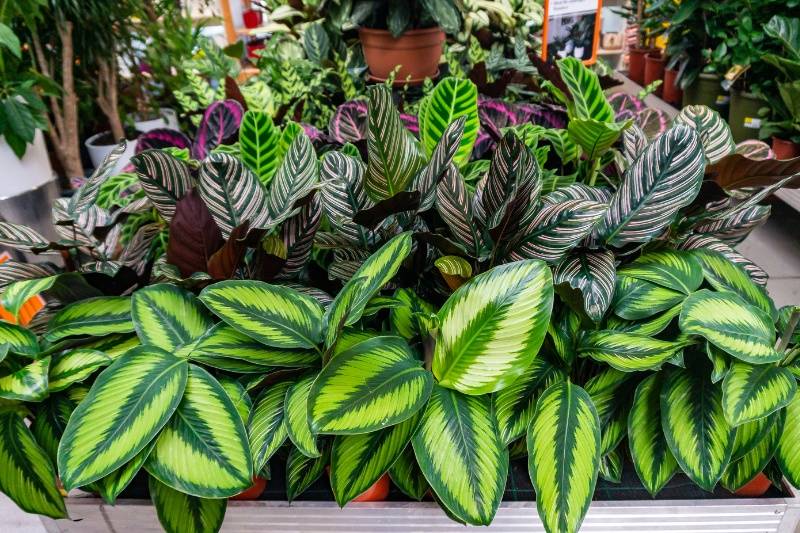
If alcohol had a personality, it would be a “problem solver” who also knocks over your lamp.
It Can Strip The Leaf’s Protective Coating
Leaves have a protective waxy layer (the cuticle) that helps prevent moisture loss and shields the plant from stress. Alcohol can break down that layer.
Result: leaves become more vulnerable to heat, sun, and dehydration.
It Can Cause Dehydration Fast
Alcohol evaporates quickly, and in the process it can pull moisture from leaf tissues. That’s when you see:
- Wilting
- Browning edges
- Crispy spots
- Overall droopiness that wasn’t there yesterday
It Can Trigger Phytotoxicity
Some plants tolerate mild spot treatments. Others react like you just insulted their whole family line.
Thin-leaf plants, seedlings, and already-stressed plants tend to show damage quickly.
If your plant reacts badly, don’t panic: move it to gentler light, water appropriately (don’t drown it), and stop treatments until it stabilizes.
What Happens If You Spray Alcohol on a Plant Bed or Soil?
Spraying alcohol on the plant bed or soil is one of those ideas that sounds practical until you think about what’s living in there.
High concentrations of alcohol can:
- Disrupt beneficial soil microbes
- Stress roots if it soaks in
- Throw off the soil ecosystem that helps plants thrive
If you’re trying to solve fungus gnats or soil pests, soil-targeted solutions like BTI or beneficial nematodes usually work better and don’t nuke your soil’s “good guys.”
Safer Alternatives to Spraying Alcohol on Plants
It’s best to use alternative methods instead of using alcohol on your plants. Don’t worry. There are plenty of natural pest repellents and home remedies that can do the job just as well, if not better.
Neem Oil Spray
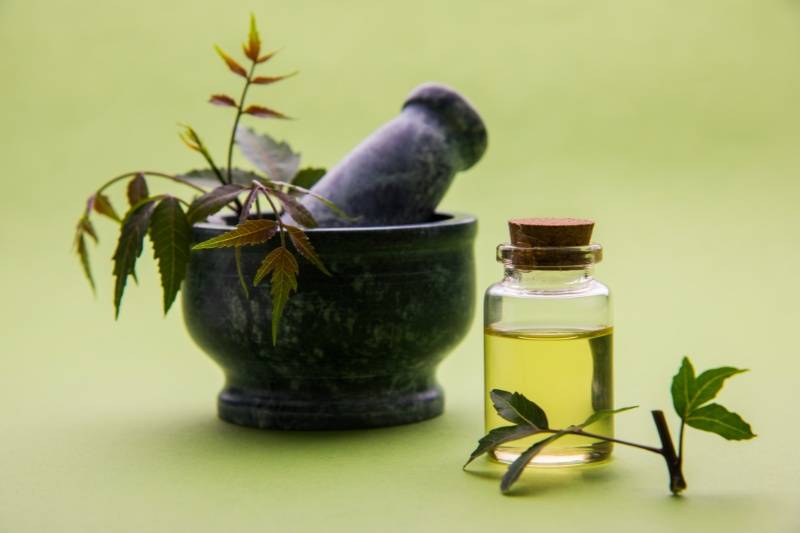
Neem is popular for a reason. It helps control a wide range of pests and can provide longer-term protection than alcohol.
Best for
- Aphids
- Whiteflies
- Spider mites
- Mild recurring pest pressure
How to use
- Mix neem oil with water and a small amount of mild soap as an emulsifier
- Spray tops and undersides of leaves
- Reapply every 7 to 10 days as needed
Watch-outs
Test on delicate plants first and avoid spraying in direct sun.
Insecticidal Soap (Or A Simple Soap Spray)
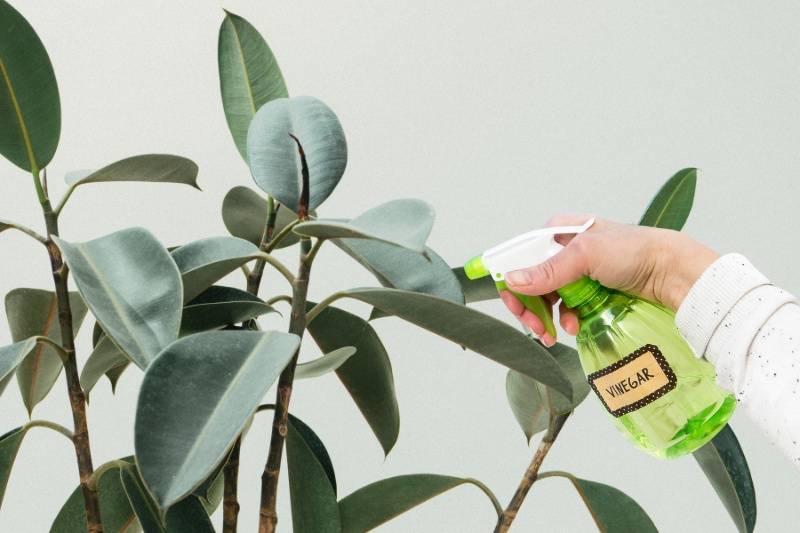
Soap sprays are a classic because they work, and they’re generally gentler than alcohol when used properly.
Best for
- Aphids
- Mealybugs
- Spider mites
How to use
- Spray pests directly, especially on the underside of leaves
- Repeat every 4 to 7 days for a couple rounds
Watch-outs
Use mild soap and don’t overdo it on sensitive plants. Always avoid blasting a plant that’s already stressed.
Diatomaceous Earth (DE)
DE is a physical pest control tool, not a chemical one. It works by damaging the bodies of crawling insects and dehydrating them.
Best for
- Crawling pests around pots and beds
- Ants, beetles, slugs (depending on the situation)
How to use
- Apply a thin layer around the base of plants and on dry soil surfaces
- Reapply after watering or rain
Watch-outs
Don’t breathe the dust, and don’t cake it all over leaves.
Sticky Traps + BTI For Fungus Gnats (My Favorite Combo)
If you’re dealing with fungus gnats, spraying alcohol is like trying to fix a leaky pipe by yelling at it. You need to break the lifecycle.
Best for
- Fungus gnat infestations in houseplants
How to use
- Yellow sticky traps catch the flying adults
- BTI (often sold as “mosquito bits”) targets larvae in soil
Why it’s better than alcohol
It solves the root cause without stressing foliage.
Beneficial Nematodes (Biological Control)
If you want something strong, natural, and effective for soil pests, beneficial nematodes can be fantastic.
Best for
- Fungus gnat larvae in soil
How to use
- Apply to moist soil
- Keep soil lightly damp for the recommended period
Watch-outs
They’re living organisms, so storage and application timing matter.
Should You Use Alcohol Solution on Plants?
Here’s my honest take: alcohol is not the best option for plants, but it can be useful in a pinch for small, targeted pest problems, especially things like mealybugs or a cluster of aphids.
If you choose to spray alcohol on plants:
- Dilute it heavily
- Patch test first
- Spot treat only
- Don’t spray in direct sun
- Don’t treat the soil/plant bed
But if you want the “best chance of healthy plants,” your safest path is usually:
- Neem oil
- Insecticidal soap
- Sticky traps + BTI for gnats
- Beneficial nematodes for soil larvae
A healthy garden is a lot like a good routine: the boring safe stuff wins most of the time.
Frequently Asked Questions (FAQ)
Not really. While rubbing alcohol can kill pests like aphids and mealybugs if used moderately, its use on plants carries significant risks. Even when diluted, rubbing alcohol can cause leaf burn, dehydration, and overall plant stress. Overuse can damage or kill plants, so it’s generally better to look for alternative pest control methods that are safer for plant health.
Yes, beer is generally bad for plants. The alcohol content in beer can harm plant roots and leaves, leading to root rot and fungal growth due to its sugar content. Pouring beer directly on plants can attract harmful bacteria and pests, causing more harm than good. While beer traps can be used to attract and eliminate slugs and snails, applying beer directly to plants is not recommended.
Spraying alcohol on a plant bed can be detrimental to plant health. High concentrations of alcohol can kill beneficial soil microorganisms, disrupt the soil ecosystem, and negatively affect plant growth. It’s best to avoid using alcohol and consider safer alternatives for pest control.
Yes, rubbing alcohol can help control gnats in plants. Fungus gnats, which commonly infest houseplants, can be treated with a diluted solution of rubbing alcohol. However, rubbing alcohol poses substantial risks to plant health. The potential for plant stress and damage often outweighs the benefits of using it. Instead, safer, more effective methods for controlling gnat infestations, such as sticky traps or natural predators like nematodes, should be considered.
